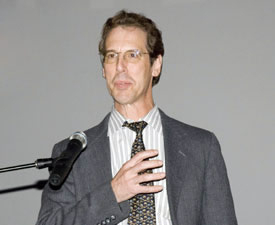The University of Houston Cullen College of Engineering is a key member of a group that has received a $1.4 million grant to undertake activities designed to provide cutting-edge continuing-education resources in aerospace engineering and train the regional aerospace workforce.
In addition to the Cullen College, the group consists of the San Jacinto College/Aerospace Academy, the UH College of Technology, University of Houston-Clear Lake, and College of the Mainland. The project is managed by the Bay Area Houston Economic Partnership and the grant is administered by the San Jacinto Aerospace Academy. The Cullen College’s involvement focuses on aerospace engineering graduate education.
An event celebrating the grant, which was awarded by the Texas Workforce Commission, was held on Nov. 8 at Space Center Houston. Speakers at the event included Michael Coats, director of the NASA Johnson Space Center, and Don Birx, UH’s vice president for research.
According to Karolos Grigoriadis, director or the Cullen College’s Aerospace Engineering Graduate Program and the principal investigator for the college’s portion of the grant, the need for such an effort is driven by technological advances that impact aerospace engineering, as well as NASA’s own strategic shifts.
“The aerospace workforce is in transition because NASA is changing focus,” he said. “NASA will retire the shuttle program in a few years. In addition, there is a new vision for space exploration beyond 2010 that involves going back to the moon, and a space mission to Mars. So there is a need to retrain the existing aerospace workforce, to produce individuals with advanced degrees and to educate young engineers who will pursue careers in the aerospace industry.”
The new educational material and resources being developed by the CCOE group, Grigoriadis said, will cover topics on adaptive and intelligent systems, smart structures and novel materials.
The list of responsibilities the Cullen College has agreed to assume as part of this effort is a long one. By the end of the Spring 2009 semester, the CCOE investigators have agreed to:
- Develop/update three undergraduate courses in mechanical engineering and a capstone design projects for aerospace engineering
- Develop/update four graduate-level aerospace engineering courses
- Develop seven graduate aerospace engineering courses for online delivery
- Provide graduate scholarships in aerospace engineering
- Develop technology demonstrations used to recruit high school students to aerospace engineering, and
- Increase enrollment in the college’s the Aerospace Engineering Graduate Program.
According to Grigoriadis, the development of online courses is one of the most important of these goals. Such courses, he said, will provide working aerospace engineers a convenient way to expand their knowledge base and pursue advanced degrees.
“The Bay Area Houston represents one of the largest concentrations of aerospace employment in the nation,” he said. “The combination of our proximity to the regional aerospace industry and the on-line course delivery can be a powerful magnet for attracting graduate students to our aerospace engineering program.”
While this program is initially aimed at the Houston region’s aerospace industry, Grigoriadis can foresee a day when the resources that grow out of it are made more widely available. “I expect that at some point we’ll look outside the region,” he said. “Online courses are growing components of higher education. We certainly hope we will go beyond and offer these courses and educational resources at the state, or even national level.”
